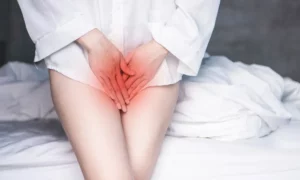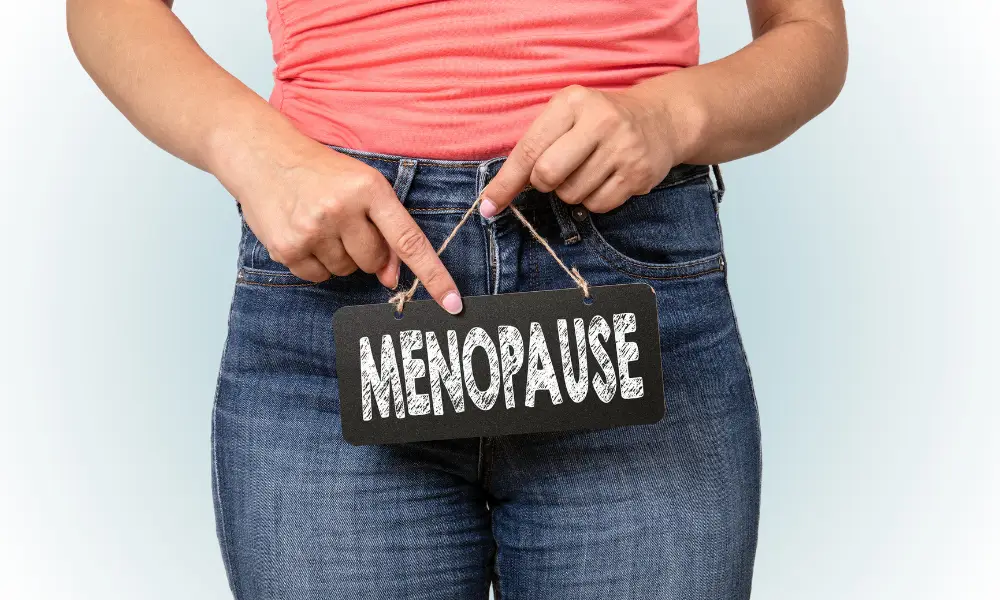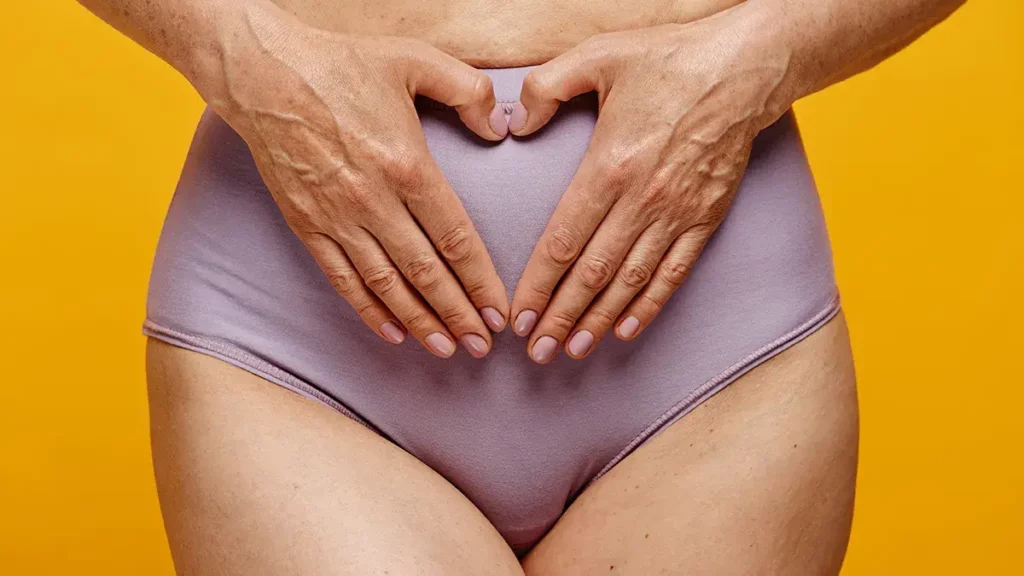Menopausal vaginal dryness is a common issue, especially for women in their 50s. Many might feel hesitant to talk about it, but if you’re experiencing this, we’ve got you covered. This article explores the symptoms, causes, and natural remedies to tackle menopausal vaginal dryness. Let’s dive in!
Contents
- 1 Understanding Menopausal Vaginal Dryness
- 2 What Causes Menopausal Vaginal Dryness
- 3 Natural Remedies for Alleviating Menopausal Vaginal Dryness
- 3.1 Aloe Vera Gel
- 3.2 Coconut Oil
- 3.3 Almond Oil
- 3.4 Soy
- 3.5 Omega-3 Fatty Acids
- 3.6 Vitamin E Supplements
- 3.7 Stay Hydrated
- 3.8 Yogurt
- 3.9 Black Cohosh Supplements
- 3.10 Flaxseed Oil
- 3.11 Regular Sexual Activity
- 3.12 Vaginal Moisturizers
- 3.13 Herbal Teas
- 3.14 Borage Oil
- 3.15 Warm Compress
- 3.16 Maintain Healthy Weight
- 3.17 Dietary Choices
- 4 Conclusion
Understanding Menopausal Vaginal Dryness
 Menopausal changes usher in a transformative phase for women, marking the conclusion of the reproductive years. This significant transition is often accompanied by a series of adjustments within the body, and one such aspect that demands our attention is menopausal vaginal dryness.
Menopausal changes usher in a transformative phase for women, marking the conclusion of the reproductive years. This significant transition is often accompanied by a series of adjustments within the body, and one such aspect that demands our attention is menopausal vaginal dryness.
As women reach their 50s, a natural and inevitable occurrence known as menopause takes center stage. This biological shift involves a decline in reproductive hormones, particularly estrogen. This hormonal ebb and flow trigger various changes, and among them is the often-overlooked challenge of vaginal dryness.
The Impact it May Bring
The hormonal fluctuations during menopause directly influence the delicate balance of the vaginal environment. As estrogen levels decline, the vaginal tissues undergo alterations, leading to reduced lubrication and moisture. This shift can result in discomfort and, in some cases, impact the overall quality of life for those experiencing it.
Symptoms
- Dryness: A noticeable lack of moisture in the vaginal area.
- Itching: Unpleasant sensations that may accompany dryness.
- Discomfort: A general unease or irritation in the vaginal region.
Menopausal vaginal dryness extends beyond the physical realm, subtly influencing daily life. The discomfort and potential pain associated with this condition can impact mood, confidence, and intimate relationships. It’s not merely a physical inconvenience but a nuanced aspect that deserves acknowledgment and understanding.
What Causes Menopausal Vaginal Dryness
 Most often, the primary culprit behind menopausal vaginal dryness is the decline in estrogen levels. Estrogen, a key hormone responsible for maintaining the health of the vaginal tissues, experiences a significant drop during menopause. This decline leads to changes in the vaginal environment, resulting in reduced lubrication and potential discomfort. However, it’s crucial to note that other factors can contribute to this condition. Let’s explore the various causes:
Most often, the primary culprit behind menopausal vaginal dryness is the decline in estrogen levels. Estrogen, a key hormone responsible for maintaining the health of the vaginal tissues, experiences a significant drop during menopause. This decline leads to changes in the vaginal environment, resulting in reduced lubrication and potential discomfort. However, it’s crucial to note that other factors can contribute to this condition. Let’s explore the various causes:
- Certain medications, such as those used for breast cancer treatment, can interfere with hormonal balance and contribute to vaginal dryness as a side effect.
- Some antidepressants, particularly selective serotonin reuptake inhibitors (SSRIs), may lead to a reduction in vaginal lubrication.
- Medications designed to counter estrogen in specific health conditions can inadvertently cause vaginal dryness.
- Cancer treatments, including chemotherapy, can disrupt hormonal levels and affect the moisture levels in the vagina.
- Sjögren’s Syndrome: An autoimmune condition that affects moisture-producing glands in the body, including those in the vagina.
- Hormonal fluctuations during childbirth and breastfeeding can temporarily impact vaginal lubrication.
- Conditions like endometriosis or lupus may contribute to hormonal imbalances and vaginal dryness.
- The choice of cleansing agents in the genital area can play a role in vaginal dryness.
- Engaging in sexual activity, especially without sufficient arousal, can contribute to vaginal dryness.
- Clothing Choices
- Dehydration and Diet
Understanding these potential causes is essential for a comprehensive approach to managing menopausal vaginal dryness. In the subsequent sections, we will delve deeper into recognizing the signs of this condition and explore effective strategies to address and alleviate its impact on daily life.
Natural Remedies for Alleviating Menopausal Vaginal Dryness

Dealing with menopausal vaginal dryness doesn’t always require complicated solutions. In fact, there are several practical and natural remedies that can provide relief and enhance comfort during this phase of life. Let’s explore some effective natural remedies to address and alleviate the symptoms of menopausal vaginal dryness:
Aloe Vera Gel
Aloe vera, known for its soothing properties, can be applied externally to the vaginal area to provide relief from dryness and irritation. Here’s how to apply it effectively:
- Clean Your Hands: Before applying aloe vera gel, ensure your hands are clean to prevent introducing any bacteria.
- Apply Evenly: Gently massage the gel onto the vaginal area, ensuring even coverage. Repeat as needed for relief.
Coconut Oil
Coconut oil serves as a natural lubricant and moisturizer. Applying a small amount to the vaginal area can help combat dryness and promote comfort. Consider these application tips:
- Clean Hands: Wash your hands thoroughly before applying coconut oil.
- Gentle Massage: Apply the oil evenly to the vaginal area using gentle, circular motions for optimal absorption.
Almond Oil
Almond oil is another natural option known for its moisturizing properties. Applying almond oil can be done as follows:
- Clean Hands: Wash your hands before applying almond oil.
- Slow Massage: Massage the oil gently onto the vaginal area, allowing it to be absorbed slowly.
Soy
Soy, a versatile legume, emerges as a beneficial ally in addressing menopausal vaginal dryness. Packed with phytoestrogens, plant-based compounds resembling estrogen, soy offers a natural approach to easing symptoms. Here’s why soy can be beneficial:
- mimic the effects of estrogen in the body, helping to counteract the decline in hormone levels associated with menopause.
- maintains the moisture balance in the vaginal tissues
- rich in nutrients like calcium and vitamin D, which are essential for overall bone health
Application Tips for Soy Products:
- Dietary Integration: Include soy-rich foods in your diet, such as tofu, edamame, soy milk, or soybeans, to harness the benefits of phytoestrogens.
- Consult with a Nutritionist: For personalized guidance on incorporating soy into your diet, consider consulting with a nutritionist to ensure an optimal balance of nutrients.
Soy, in various forms, not only addresses menopausal vaginal dryness but also contributes to overall health, making it a valuable addition to your dietary choices during this life stage.
Omega-3 Fatty Acids
Incorporating foods rich in omega-3 fatty acids, such as flaxseeds, chia seeds, and fatty fish, into your diet can contribute to overall vaginal health by supporting moisture levels.
Vitamin E Supplements
Vitamin E is known for its skin-nourishing properties. Taking vitamin E supplements or including vitamin E-rich foods like almonds and sunflower seeds in your diet may offer relief.
Stay Hydrated
Maintaining adequate hydration is crucial for overall health, including vaginal moisture. Ensure you’re drinking enough water throughout the day.
Yogurt
Probiotic-rich foods like yogurt can help maintain the balance of healthy bacteria in the vagina, supporting its natural environment.
Black Cohosh Supplements
Black cohosh, an herbal supplement, has been associated with relieving menopausal symptoms, including vaginal dryness. Consult with a healthcare professional before incorporating supplements.
Flaxseed Oil
Flaxseed oil, rich in omega-3 fatty acids, can be a valuable addition to your diet or taken as a supplement to support vaginal health.
Regular Sexual Activity
Engaging in regular sexual activity, when comfortable, can stimulate blood flow to the pelvic area and promote natural lubrication.
Vaginal Moisturizers
Non-prescription vaginal moisturizers, designed specifically for menopausal dryness, can provide ongoing relief. Look for products free of irritants and fragrances.
Herbal Teas
Certain herbal teas, like chamomile or red clover tea, are believed to have mild estrogenic effects, potentially offering relief from vaginal dryness.
Borage Oil
Borage oil, rich in gamma-linolenic acid (GLA), is another natural supplement that may help improve vaginal moisture levels. Consult with a healthcare professional before use.
Warm Compress
Applying a warm compress to the genital area can alleviate dryness and provide a soothing effect.
Maintain Healthy Weight
Achieving and maintaining a healthy weight contributes to overall well-being, which can positively impact hormonal balance and vaginal health.
Dietary Choices
Choose a diet rich in fruits, vegetables, and whole grains, providing essential nutrients for overall health, including vaginal health.
Before incorporating any supplements or making significant changes to your diet, it’s advisable to consult with a healthcare professional, especially if you have underlying health conditions. These home remedies are meant to complement your overall health and well-being, offering natural alternatives to manage menopausal vaginal dryness.
Conclusion
As we wrap up our exploration of menopausal vaginal dryness, it becomes evident that addressing women’s health requires a comprehensive and empathetic approach. Menopause is a transformative phase, and acknowledging its nuanced challenges is essential for fostering well-being.
Navigating menopausal vaginal dryness involves understanding its multifaceted nature, from hormonal shifts to lifestyle factors. While home remedies offer valuable support, seeking guidance from healthcare professionals is paramount for personalized care.
In this journey toward well-being, platforms like HerMantra emerge as beacons of support. HerMantra is not just a platform; it’s a commitment to women’s wellness. With top health coaches available for teleconsultation, HerMantra provides accessible and personalized treatment whenever and wherever it’s needed.
Begin on your wellness journey with HerMantra – where women’s health is not just a priority; it’s a mantra for a vibrant and fulfilling life.
If you are facing menopause related issues, menopause treatment at HerMantra can help. Book your free trial online menopause treatment session now.


